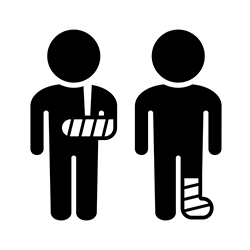Editor’s Note: As individuals with vision loss, navigating hazards at home can be tricky, dangerous, and take some time getting used to. Because June is National Home Safety Month, the VisionAware peer advisors are sharing stories about their in-home accidents, reasons why accidents happen to individuals living with visual impairment, and how they can be prevented. Heed their advice and utilize VisionAware resources to help you be safer in your home.
Preventing Falls and Accidents

Would you believe that I’ve been punched in the nose by a refrigerator, a closet door ajar, and even a wall? It’s all been caused by my hurrying frantically to get just one more task done, just one more email answered, just one more load in the washer before my ride comes.
Slow Down and Pay Attention
I hate sitting around, even for a couple of minutes, waiting for a ride, but I hate going out into the world with a black eye even more.
Most of my minor injuries have been caused by rushing and therefore scraping my hand on a corner, barking my shins on an open dishwasher door, tripping over a dog toy, or bumping my hip against a chair. But the majority of accidents happen when I’m not focused on the task at hand, that is, to get from point A to point B safely and with dignity. In other words, I need to pay more attention to what I’m doing.
Pay Attention and Memorize
Here’s one of the most poignant examples of what happens when I don’t focus on the task at hand.
I confidently walked up five or six steps with my guide dog to enter a building and was directed to the room where the workshop was being held. I knew the presenter, and we had made plans to go to another meeting together after this workshop was over. As we walked out of the building talking, I was concentrating on our conversation and trying to be clever and attentive to him, not to where my feet were taking me. When we approached the steps, my friend, being sighted, did not stop at the top as a guide dog would; instead, he just stepped off and continued down the steps. My guide dog did the same, that is, not stop and continued down the steps. However, when I stepped off the first step, my next step was into thin air, and I landed quite embarrassed and beat up at the bottom of the steps. My dog was mortified. My skirt was up around my hips, and my knees were scraped and bleeding. My friend was concerned and apologetic, but it wasn’t his fault. Had I not been trying to flirt, I would have remembered those steps and been more cautious as we approached them, thus giving the heads up to my dog that she needed to stop at the top of the flight, not the bottom.
Ever since then, as a totally blind traveler, I vowed always to concentrate and be aware and memorize the obstacles and clues along the way for a safe return.
How Corners of Tables Jump Up and Hit Me
Whenever I bend over to pick something up off the floor, a shoe, a dropped tissue, a fork, or to tie my shoe, straighten a throw rug, or retrieve a dog toy, the strangest thing happens. The back of a chair, a corner of a table, or even a door knob will jump up and clobber me in the face or the top of my head. I’ve developed a habit of shielding my face with the inside of my elbow each time I bend over just in case this should happen again. You never know. Only the first time I forget, bam; there it happens again. No matter how sure I am that I am far away from such jumping objects, every once in a while, they trick me and off to church I go with a bump on my forehead. Talk about the bumps in life. All I can do is try to slow down, be aware, and pay attention.
My Advice
Sit in a chair and don’t move all day. No, just kidding. Being blind is not an excuse to be a couch potato. It is not a reason for acting helpless. It is the motivation to learn to move around, do what you need to do, and even have fun. Hard knocks are part of life, blind or not, but thinking first can soften the blows.
VisionAware Resources for Avoiding Accidents at Home
Protecting Your Upper Body from Hazards Around the Home
Protecting Your Lower Body from Hazards
Searching for Dropped Objects When You Are Visually Impaired